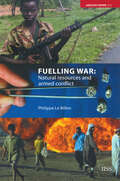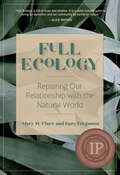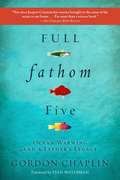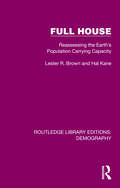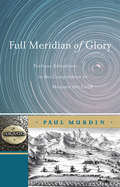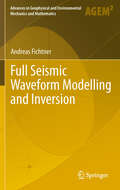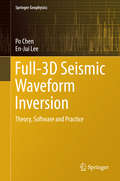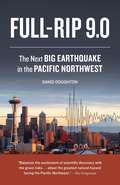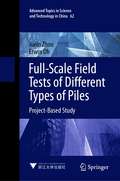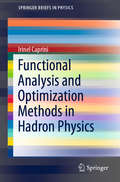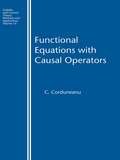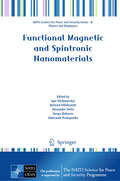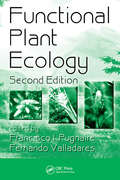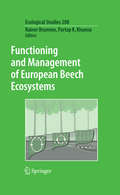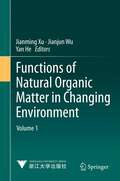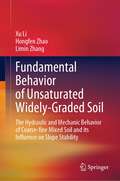- Table View
- List View
Fuelling War: Natural Resources and Armed Conflicts (Adelphi series #373)
by Philippe Le BillonA generous endowment of natural resources should favour rapid economic and social development. The experience of countries like Angola and Iraq, however, suggests that resource wealth often proves a curse rather than a blessing. Billions of dollars from resource exploitation benefit repressive regimes and rebel groups, at a massive cost for local populations. This Adelphi Paper analyses the economic and political vulnerability of resource-dependent countries; assesses how resources influence the likelihood and course of conflicts; and discusses current initiatives to improve resource governance in the interest of peace. It concludes that long-term stability in resource-exporting regions will depend on their developmental outcomes, and calls for a broad reform agenda prioritising the basic needs and security of local populations.
Full Circles: Geographies of Women over the Life Course (Routledge International Studies of Women and Place)
by Cindi Katz Janice MonkFull Circles describes the very different lives and expectations of women in post-industrial and developing countries from childhood to old age. Analysing how class, ethnicity, nationality and individual values intersect with the experience of the life course, the book explores the futures open to women in diverse and changing locations.
Full Ecology: Repairing Our Relationship with the Natural World
by Gary Ferguson Mary M. ClareHow to confront the climate crisis without losing heart It’s easy to feel overwhelmed in the face of global climate breakdown. So how might we develop the inner resolve to confront it? Full Ecology, a collaboration between social-cultural psychologist Mary M. Clare and longtime science writer Gary Ferguson, suggests a path forward. Breaking the modern impulse to see humans as separate from nature, Clare and Ferguson encourage us to learn from the &“supremely methodical and highly improvisational&” natural systems that touch our lives. True change, they argue, begins with us stopping and questioning assumptions about our place in the world. From this process of reflection, they offer us an alternative blueprint for acting in ecologically healthy ways, and for inspiring others to do the same. Rather than proposing a ten-step plan to save the earth, this book encourages a more elemental rethinking of our connections to nature, and of how such connections might be strengthened for the common good. Practical and poetic, scientific and spiritual, Full Ecology presents a strong, nourishing foundation for climate action.
Full Fathom Five: Ocean Warming and a Father's Legacy
by Gordon Chaplin Stan Waterman"Not since Jacques Cousteau has anyone brought us the sense of the ocean as our home . . . Far more than a science book.” -San Francisco Book ReviewGordon Chaplin’s father was a seemingly happy-go-lucky, charismatic adventurer who married a wealthy heiress and transformed himself into the author of a landmark scientific study, Fishes of the Bahamas. The book was published by the Academy of Natural Sciences of Philadelphia, one of America's most esteemed scientific institutions. As a young boy, the author took part in collecting specimens for his father. Fifty years later, he was asked to join a team studying the state of sea life in the Bahamian waters where he grew up, as measured against his father’s benchmark.The first of the sea changes presented in this eloquent book stems from climate change and is the drastic transformation of ocean life due to global warming. The second is his father’s miraculous transformation from playboy into scientist. And the third involves the author’s own complicated relationship with his parents, in particular his father, as he grew older and assumed the part of prodigal son. Fifty years later, returning to his childhood home, he delves into the mysteries of his father’s life and the impossibility of ever truly recovering the past or returning home.
Full House: Reassessing the Earth’s Population Carrying Capacity (Routledge Library Editions: Demography #2)
by Lester R. Brown Hal KaneOriginally published in 1995, after decades of steady growth, this book was written at a time when the world’s food supply was no longer keeping up with population increases. This book examines the causes of the imbalance in the food/population equation and suggests ways in which Malthusian checks can be countered. It calls for an international strategy to restore global security, and a budget to implement it, with a massive redirection of the world’s financial resources. On one side of the argument the authors advocate increased expenditure on family planning services, education, and women’s rights. On the other, they stress the environmental importance of reforestation and soil conservation schemes to halt the deterioration of the agricultural resource base.
Full Meridian of Glory
by Paul Murdin[the text below needs editing and we must be careful not to say things about Dan Brown's book that could get Springer in legal trouble] Dan Brown's novel, The Da Vinci Code, was first published in 2003; its sales have reached 40 million worldwide. The book mixes a small spice of fact into a large dollop of fiction to create an entertaining novel of intrigue, adventure, romance, danger and conspiracy, which have been imaginatively worked together to cook up the successful bestseller. Most interest in the book's origins has centred on the sensational religious aspects. Dan Brown has written: 'All of the art, architecture, secret rituals, secret societies, all of that is historical fact.' This gives an air of authenticity to the book. Brown has, however, made up the religious doctrines, or based them on questionable accounts by others. The locations of the actions of The Da Vinci Code are not, however, made up. The present book is the scientific story behind the scene of several of the book's actions that take place on the axis of France that passes through Paris. The Paris Meridian is the name of this location. It is the line running north-south through the astronomical observatory in Paris. One of the original intentions behind the founding of the Paris Observatory was to determine and measure this line. The French government financed the Paris Academy of Sciences to do so in the seventeenth to nineteenth centuries. It employed both astronomers - people who study and measure the stars - and geodesists - people who study and measure the Earth. This book is about what they did and why. It is a true story behind Dan Brown's fiction. This is the first English language presentation of this historical material. It is attractively written and it features the story of the community of scientists who created the Paris Meridian. They knew each other well - some were members of the same families, in one case of four generations. Like scientists everywhere they collaborated and formed alliances; they also split into warring factions and squabbled. They travelled to foreign countries, somehow transcending the national and political disputes, as scientists do now, their eyes fixed on ideas of accuracy, truth and objective, enduring values - save where the reception given to their own work is concerned, when some became blind to high ideals and descended into petty politics. To establish the Paris Meridian, the scientists endured hardship, survived danger and gloried in amazing adventures during a time of turmoil in Europe, the French Revolution and the Napoleonic War between France and Spain. Some were accused of witchcraft. Some of their associates lost their heads on the guillotine. Some died of disease. Some won honour and fame. One became the Head of State in France, albeit for no more than a few weeks. Some found dangerous love in foreign countries. One scientist killed in self defence when attacked by a jealous lover, another was himself killed by a jealous lover, a third brought back a woman to France and then jilted her, whereupon she joined a convent. The scientists worked on practical problems of interest to the government and to the people. They also worked on one of the important intellectual problems of the time, a problem of great interest to their fellow scientists all over the world, nothing less than the theory of universal gravitation. They succeeded in their intellectual work, while touching politics and the affairs of state. Their endeavours have left their marks on the landscape, in art and in literature.
Full Seismic Waveform Modelling and Inversion
by Andreas FichtnerRecent progress in numerical methods and computer science allows us today to simulate the propagation of seismic waves through realistically heterogeneous Earth models with unprecedented accuracy. Full waveform tomography is a tomographic technique that takes advantage of numerical solutions of the elastic wave equation. The accuracy of the numerical solutions and the exploitation of complete waveform information result in tomographic images that are both more realistic and better resolved. This book develops and describes state of the art methodologies covering all aspects of full waveform tomography including methods for the numerical solution of the elastic wave equation, the adjoint method, the design of objective functionals and optimisation schemes. It provides a variety of case studies on all scales from local to global based on a large number of examples involving real data. It is a comprehensive reference on full waveform tomography for advanced students, researchers and professionals.
Full-3D Seismic Waveform Inversion
by Po Chen En-Jui LeeThis book introduces a methodology for solving the seismic inverse problem using purely numerical solutions built on 3D wave equations and which is free of the approximations or simplifications that are common in classical seismic inversion methodologies and therefore applicable to arbitrary 3D geological media and seismic source models. Source codes provided allow readers to experiment with the calculations demonstrated and also explore their own applications.
Full-Rip 9.0: The Next Big Earthquake in the Pacific Northwest
by Sandi DoughtonScientists have identified Seattle, Portland, and Vancouver as the urban centers of what will be the biggest earthquake--the Really Big One--in the continental United States. A quake will happen--in fact it's actually overdue. The Cascadia subduction zone is 750 miles long, running along the Pacific coast from Northern California up to southern British Columbia. In this fascinating book, The Seattle Times science reporter Sandi Doughton introduces readers to the scientists who are dedicated to understanding the way the earth moves and describes what patterns can be identified and how prepared (or not) people are. With a 100% chance of a mega-quake hitting the Pacific Northwest, this fascinating book reports on the scientists who are trying to understand when, where, and just how big THE BIG ONE will be.From the Trade Paperback edition.
Full-Scale Field Tests of Different Types of Piles: Project-Based Study (Advanced Topics in Science and Technology in China #62)
by Erwin Oh Jialin ZhouThis book provides full-scale field tests of different types of pile foundations. For the testing, it includes static load tests which consider various loading orientations, dynamic load tests, inclinometer monitoring and tests that aim to determine the load transfer mechanism of pile foundation. This book also covers the up-to-date popular topic with detailed project studies. This includes the academic investigation of post-grouting technology effect on drilled shaft piles, the research of displacement and non-displacement precast pile foundation, the study of fiber-reinforced polymer material used in the geo-technical environment such as deep excavation pit in tunneling project, and the research of super-long and large diameter pile foundations. These investigations provide essential and academic information for researchers as well as engineers in role of Civil and Geotech. Not only the different types of the piles are studied, but also the relevant theory and literatures are reviewed. In this book, the diagrams are plotted in an easy way and the explanation of the diagrams and tables are described in detail. The research methods corresponding to the practical projects are detailed as well. Hence, it is useful as a reference for the students and researchers in civil and geotechnical engineering.
Fullerenes: Nanochemistry, Nanomagnetism, Nanomedicine, Nanophotonics
by Elena ShekaAt the interface between chemistry, biology, and physics, fullerenes were one of the first objects to be dissected, scanned, and studied by the modern multi-specialty biotech community and are currently thriving in both research and practical application. Other members of the sp2 nanocarbon family, such as nanotubes and graphene, are currently bein
Fully Alive: Using the Lessons of the Amazon to Live Your Mission in Business and Life
by Tyler GageFully Alive tells the story of an astoundingly successful young entrepreneur’s immersion in Amazonian indigenous spirituality, its life-changing impact on him, and how he integrated the lessons he learned to build a successful, socially responsible company, live a purposeful life, and make a difference in the world.Building a start-up is like being thrust into the middle of the Amazon rainforest: living every day on the edge of your comfort zone, vulnerable to the unexpected challenges constantly being thrown your way, and constantly shifting to meet daily demands and do everything and anything you can to survive, let alone thrive. Vulnerable, raw, and deeply transparent, Fully Alive reveals powerful tools and lessons that can teach all of us how to grow toward and beyond our personal edges, no matter our circumstances. Tyler Gage shares his spiritual adventures and the business savvy that helped him create RUNA, a pioneering organization that weaves together the seemingly divergent worlds of Amazonian traditions and modern business, demonstrating how we can dig deeper to bring greater meaning and purpose to our personal and professional pursuits. From suburban youth to immersion in the Amazon to entrepreneurial success, Tyler's journey clearly shows that passion and opportunity can be found in the most unexpected places. Captivated by a rare Amazonian tea leaf called guayusa that had never been commercially produced, Tyler started RUNA to partner with the indigenous people of Ecuador to share its energy and its message with the world. Using the spiritual teachings, lessons, and healing traditions of the Amazon as his guide, Tyler built RUNA from a scrappy start-up into a thriving, multimillion-dollar company that has become one of the fastest-growing beverage companies in the United States. With the help of investors such as Channing Tatum, Leonardo DiCaprio, and Olivia Wilde, RUNA has created a sustainable source of income for more than 3,000 farming families in Ecuador who sustainably grow guayusa in the rainforest. Simultaneously, RUNA has built a rapidly scaling nonprofit organization that is working to create a new future for trade in the Amazon based on respectful exchange and healing, not exploitation and greed. Practical tools and lessons are woven throughout the story of Gage’s successes and failures, offering guidance on how to relate to obstacles as teachers and how to accomplish our personal and professional goals in the often uncertain circumstances we find ourselves in.
Functional Analysis and Optimization Methods in Hadron Physics (SpringerBriefs in Physics)
by Irinel CapriniThis book begins with a brief historical review of the early applications of standard dispersion relations in particle physics. It then presents the modern perspective within the Standard Model, emphasizing the relation of analyticity together with alternative tools applied to strong interactions, such as perturbative and lattice quantum chromodynamics (QCD), as well as chiral perturbation theory. The core of the book argues that, in order to improve the prediction of specific hadronic observables, it is often necessary to resort to methods of complex analysis more sophisticated than the simple Cauchy integral. Accordingly, a separate mathematical chapter is devoted to solving several functional analysis optimization problems. Their applications to physical amplitudes and form factors are discussed in the following chapters, which also demonstrate how to merge the analytic approach with statistical analysis tools. Given its scope, the book offers a valuable guide for researchers working in precision hadronic physics, as well as graduate students who are new to the field.
Functional Analysis, Calculus of Variations and Numerical Methods for Models in Physics and Engineering
by Fabio Silva BotelhoThe book discusses basic concepts of functional analysis, measure and integration theory, calculus of variations and duality and its applications to variational problems of non-convex nature, such as the Ginzburg-Landau system in superconductivity, shape optimization models, dual variational formulations for micro-magnetism and others. Numerical Methods for such and similar problems, such as models in flight mechanics and the Navier-Stokes system in fluid mechanics have been developed through the generalized method of lines, including their matrix finite dimensional approximations. It concludes with a review of recent research on Riemannian geometry applied to Quantum Mechanics and Relativity. The book will be of interest to applied mathematicians and graduate students in applied mathematics. Physicists, engineers and researchers in related fields will also find the book useful in providing a mathematical background applicable to their respective professional areas.
Functional Equations with Causal Operators (Stability And Control Ser. #Vol. 16)
by C. CorduneanuFunctional equations encompass most of the equations used in applied science and engineering: ordinary differential equations, integral equations of the Volterra type, equations with delayed argument, and integro-differential equations of the Volterra type. The basic theory of functional equations includes functional differential equations with cau
Functional Magnetic and Spintronic Nanomaterials (NATO Science for Peace and Security Series B: Physics and Biophysics)
by Igor Vladymyrskyi Burkard Hillebrands Denys Makarov Alexander Serga Oleksandr ProkopenkoMacroscopic objects made of magnetic materials have been known to mankind for several thousand years and are widely used in various fields of human activity. With the development and practical implementation of microelectronics, and more recently nanoelectronics, it has become possible to develop and manufacture magnetic nanomaterials, dramatically expanding the scope of magnetics in modern technologies. Today, magnetic nanomaterials and nanostructures are key components of advanced information technologies. They are widely used in eMobility, medicine, sensors, robotics, etc., and have significant potential for application in prospective smart wearables and human-machine interfaces. This volume outlines recent research in the field of functional magnetic and spintronic materials. Each of the 10 chapters in the volume is self-contained, allowing the topics to be explored independently of the material in other chapters. The book covers the entire “life cycle” of magnetic/spintronic nanomaterials: from theoretical and numerical studies of their properties (Ch. 1), fabrication and experimental study of film systems (Ch. 2), fabrication of nanostructures (Ch. 3), study of electromagnetic phenomena occurring in such nanostructures (Chs. 4-10), to the use of these nanostructures in new technologies, particularly in spintronic energy harvesting (Ch. 9) and quantum sensing (Ch. 10). Some of the contributions to this volume were presented as lectures and reports at the Advanced Research Workshop “Functional Spintronic Nanomaterials for Radiation Detection and Energy Harvesting” (25–27 September 2023, Kyiv, Ukraine), which was supported by the NATO Science for Peace and Security Programme.
Functional Metal Oxide Nanostructures
by Junqiao Wu Jinbo Cao Wei-Qiang Han Ho-Cheol Kim Anderson JanottiMetal oxides and particularly their nanostructures have emerged as animportant class of materials with a rich spectrum of properties and greatpotential for device applications. In this book, contributions from leadingexperts emphasize basic physical properties, synthesis and processing, and thelatest applications in such areas as energy, catalysis and data storage. Functional Metal Oxide Nanostructuresis an essential reference for any materials scientist or engineer with aninterest in metal oxides, and particularly in recent progress in defectphysics, strain effects, solution-based synthesis, ionic conduction, and theirapplications.
Functional Plant Ecology (Books in Soils, Plants, and the Environment)
by Francisco I. Pugnaire Fernando ValladaresFollowing in the footsteps of the successful first edition, Functional Plant Ecology, Second Edition remains the most authoritative resource in this multidisciplinary field. Extensively revised and updated, this book investigates plant structure and behavior across the ecological spectrum. It features the ecology and evolution of plant crowns and a
Functional Polymer Nanocomposites for Wastewater Treatment (Springer Series in Materials Science #323)
by Suprakas Sinha Ray Mpitloane Joseph HatoThis book provides an overview of the latest advances in applications of nanocomposites in wastewater treatment. This book is dedicated to recent developments in the application of polymer nanocomposites to wastewater treatment. Based on their morphology and tailored compositions, polymer nanocomposites provide powerful tools for environmental remediation via selective adsorption of contaminants in complex environmental matrices. The book reviews recent progress in this field, covering various nanocomposite fabrication routes and novel applications for pollutant sensing and detection. It includes discussion of different types of nanocomposites based on metal–organic frameworks and hydrogels, while also covering related topics such as nanocomposite membranes, photocatalysts, and bio-nanocomposites for pollution abatement. Ideal for researchers and engineers in the field, this collection of contributed chapters offers a timely review of current research in nanomaterials for cost-effective pollution control technologies.
Functioning and Management of European Beech Ecosystems
by Rainer Brumme Partap K. KhannaThis volume compiles the results of long-term observations of site properties and ecosystem processes for three beech forests. Representing a spectrum of common beech forest sites in Central Europe, they receive similar atmospheric inputs and are growing under similar climatic conditions, but differ in their soil acidity. Significant differences were observed in the diversity and activities of fauna and microbes in these soils, which was the major driving variable for the nutrient cycling processes, growth patterns, greenhouse gas emissions and the C and N sequestration in these forests. Differences in N and C contents and cycling among the three beech sites represented three phases (quasi steady-state, accumulation and degradation) as described by ecosystem theory on the functioning and historical development of the N dynamic of other 50 European ecosystems. Various implications for the future management of these and similar beech sites are discussed.
Functions of Natural Organic Matter in Changing Environment
by Jianming Xu Jianjun Wu Yan HeFunctions of Natural Organic Matter in Changing Environment presents contributions from the 16th Meeting of the International Humic Substances Society (IHSS 16) held in Hangzhou, China on September 9-14, 2012. It provides a comprehensive and updated research advance in the field of characterization, function, application of humic substances (HS) and natural organic matter (NOM) in environment, agriculture, and industry. A broad range of topics are covered: i) formation, structure and characteristics of HS and NOM; ii) HS/NOM and carbon sequestration; iii) HS/NOM and biogeochemical cycling of nutrients; iv) HS/NOM and the environmental processes of toxic elements and anthropogenic organics; v) HS/NOM, naturally occurring and engineered nanoparticles; vi) HS/NOM, biodiversity and ecosystem health; vii) HS/NOM in water and water treatment; viii) characterization and function of biochar in the environment; and ix) industrial products and application of HS. The book will be an invaluable reference for chemists, biologists, environmental scientists, ecologists, soil scientists, water scientists, agronomists, global change researchers and policy makers. Jianming Xu is Professor and Director at the Institute of Soil and Water Resources and Environmental Science, Zhejiang University, Hangzhou, China. Jianjun Wu is Professor at the Institute of Soil and Water Resources and Environmental Science, Zhejiang University, Hangzhou, China. Yan He is Associate Professor at the Institute of Soil and Water Resources and Environmental Science, Zhejiang University, Hangzhou, China.
Fundamental Aspects of Plasma Chemical Physics
by Annarita Laricchiuta Domenico Bruno Mario CapitelliFundamental Aspects of Plasma Chemical Physics: Transport develops basic and advanced concepts of plasma transport to the modern treatment of the Chapman-Enskog method for the solution of the Boltzmann transport equation. The book invites the reader to consider actual problems of the transport of thermal plasmas with particular attention to the derivation of diffusion- and viscosity-type transport cross sections, stressing the role of resonant charge-exchange processes in affecting the diffusion-type collision calculation of viscosity-type collision integrals. A wide range of topics is then discussed including (1) the effect of non-equilibrium vibrational distributions on the transport of vibrational energy, (2) the role of electronically excited states in the transport properties of thermal plasmas, (3) the dependence of transport properties on the multitude of Saha equations for multi-temperature plasmas, and (4) the effect of the magnetic field on transport properties. Throughout the book, worked examples are provided to clarify concepts and mathematical approaches. This book is the second of a series of three published by the Bari group on fundamental aspects of plasma chemical physics. The first book, Fundamental Aspects of Plasma Chemical Physics: Thermodynamics, is dedicated to plasma thermodynamics; and the third, Fundamental Aspects of Plasma Chemical Physics: Kinetics, deals with plasma kinetics.
Fundamental Behavior of Unsaturated Widely-Graded Soil: The Hydraulic and Mechanic Behavior of Coarse-fine Mixed Soil and its Influence on Slope Stability
by Limin Zhang Xu Li Hongfen ZhaoThis book focuses on the engineering properties of unsaturated widely graded soils and their influence on slope stability. This book characterizes the natural widely graded colluvial soils from macroscale, mesoscale, and microscale viewpoints, introduces the techniques for measuring hydro-mechanical properties for unsaturated widely graded colluvial soils, and clarifies the hydro-mechanical behavior and the failure mechanism of widely graded colluvial soils subjected to environmental loads. This book improves the understanding of rainfall-induced landslides on natural slopes. Researchers and engineers in the field of civil engineering can benefit from the book.
Fundamental Mass Transfer Concepts in Engineering Applications
by Ismail TosunFundamental Mass Transfer Concepts in Engineering Applications provides the basic principles of mass transfer to upper undergraduate and graduate students from different disciplines. This book outlines foundational material and equips students with sufficient mathematical skills to tackle various engineering problems with confidence. It covers mass transfer in both binary and multicomponent systems and integrates the use of Mathcad® for solving problems. This textbook is an ideal resource for a one-semester course. Key Features The concepts are explained with the utmost clarity in simple and elegant language Presents theory followed by a variety of practical, fully-worked example problems Includes a summary of the mathematics necessary for mass transfer calculations in an appendix Provides ancillary Mathcad® subroutines Includes end-of-chapter problems and a solutions manual for adopting instructors
Fundamental Math and Physics for Scientists and Engineers
by David Yevick Hannah YevickThis text summarizes the core undergraduate physics curriculum together with the mathematics frequently encountered in engineering and physics calculations, focusing on content relevant to practical applications.Covers major undergraduate physics topics including the complete Physics GRE subject examination syllabusOverview of key results in undergraduate applied mathematics and introduces scientific programmingPresents simple, coherent derivations and illustrations of fundamental concepts
